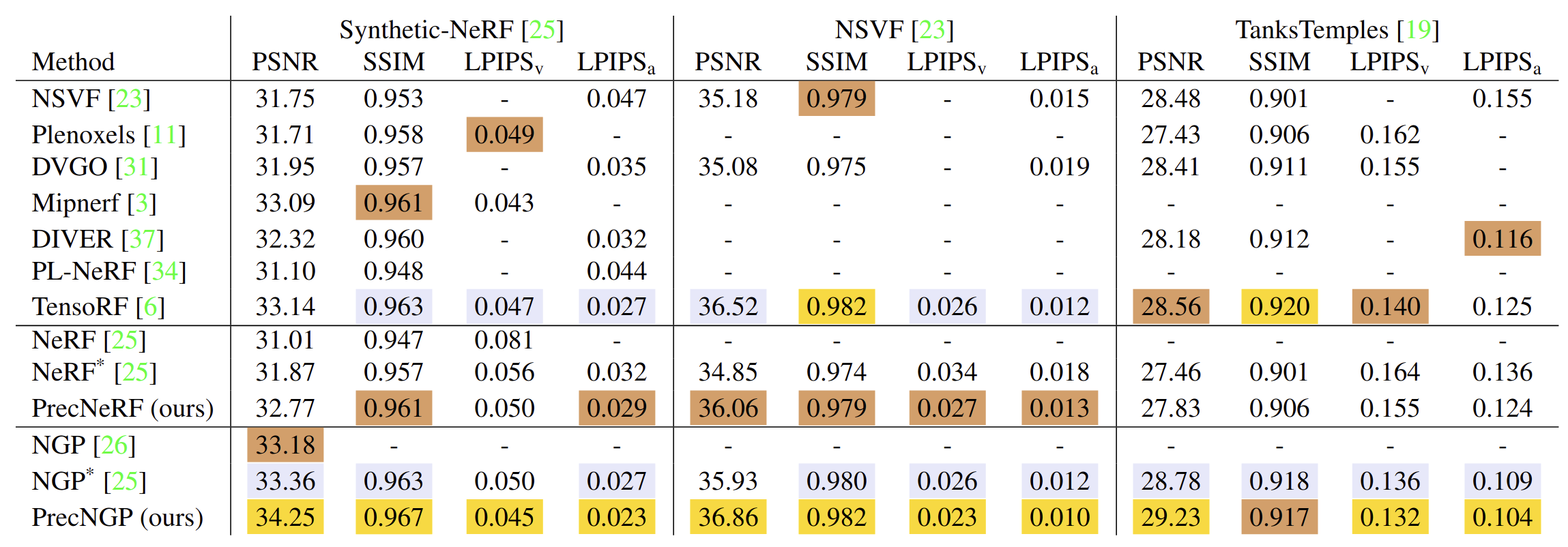Precise Integral in NeRFs: Overcoming the Approximation Errors of Numerical Quadrature
Boyuan Zhang1, Zhenliang He1, Meina Kan1,2, Shiguang Shan1,2
1Key Lab of AI Safety, Institute of Computing Technology, CAS, China
2University of Chinese Academy of Sciences, China
We propose a simple yet effective segment representation to relieve the approximation errors of numerical quadrature in NeRFs.
We use several public datasets (nerf_synthetic, Synthetic_NSVF, TanksAndTemple, 360v2, multiscale) to train/evaluate our precise integral methods versus quadrature methods(original NeRFs). Please refer to the original website and repository (NeRF Synthetic, NSVF, multiscale, 360v2) to download the data and organize the data structure as:
/Precise-NeRF
/data
/nerf_synthetic
/NSVF
/Synthetic_NSVF
/TanksAndTemple
/multiscale # multiscale nerf synthetic
/360v2
/360_extra
Then add soft links to the respective subfolders,
cd /Precise-NeRF
ln -s ./data ./NeRF_related/data
ln -s ./data ./NGP_related/data
ln -s ./data ./PyNeRF_related/PyNeRF/data
ln -s ./data ./PyNeRF_related/PrecPyNeRF/data
The codes for NeRF/PrecNeRF, NGP/PrecNGP, PyNeRF/PrecPyNeRF are in the folders NeRF_related, NGP_related, PyNeRF_related respectively.
We refer to nerfstudio as our framework to implement PrecNeRF. First setup the conda environment:
conda create --name nerfstudio -y python=3.8
pip install torch==2.1.2+cu118 torchvision==0.16.2+cu118 --extra-index-url https://download.pytorch.org/whl/cu118
conda install -c "nvidia/label/cuda-11.8.0" cuda-toolkit
export TCNN_CUDA_ARCHITECTURES=86
pip install ninja git+https://github.com/NVlabs/tiny-cuda-nn/#subdirectory=bindings/torch
Then install nerfstudio and PrecNeRF as:
git clone https://github.com/Moreland-cas/PrecNeRF
conda activate nerfstudio
cd Precise-NeRF/NeRF_related/nerfstudio
pip install -e .
cd ../SegNeRF # here SegNeRF equals to PrecNeRF
pip install -e .
We use the ns-train command provided by nerfstudio to train NeRF and PrecNeRF.
cd Precise-NeRF/NeRF_related
ns-train vanilla-nerf --output-dir path_to_outputs --data ./data/nerf_synthetic/xxx
ns-train segnerf --output-dir path_to_outputs --data ./data/nerf_synthetic/xxx
cd Precise-NeRF/NeRF_related
ns-train vanilla-nerf --output-dir path_to_outputs --data ./data/NSVF/Synthetic_NSVF/xxx
ns-train segnerf nsvf --output-dir path_to_outputs --data ./data/NSVF/Synthetic_NSVF/xxx
cd Precise-NeRF/NeRF_related
ns-train vanilla-nerf --output-dir path_to_outputs --data ./data/NSVF/TanksAndTemple/xxx
ns-train segnerf --output-dir path_to_outputs --data ./data/NSVF/TanksAndTemple/xxx
Note: When training on nerf_synthetic, the config used for dataparser should be BlenderDataParserConfig(), whereas NsvfDataParserConfig() for Synthetic_NSVF and TanksAndTemple.
We use the ns-eval command to evaluate the trained models.
ns-eval --load_config path_to_outputs/your_model/configs.yaml --output_path path_to_dump
We refer to nerfacc as our framework to implement NGP/PrecNGP. First setup the conda environment:
conda create --name nerfacc -y python=3.8
pip install torch==2.1.2+cu118 torchvision==0.16.2+cu118 --extra-index-url https://download.pytorch.org/whl/cu118
conda install -c "nvidia/label/cuda-11.8.0" cuda-toolkit
export TCNN_CUDA_ARCHITECTURES=86
pip install ninja git+https://github.com/NVlabs/tiny-cuda-nn/#subdirectory=bindings/torch
Then install nerfacc as:
cd Precise-NeRF/NGP_related
conda activate nerfacc
pip install -e .
Run the scripts in NGP_related to train NGP and PrecNGP, the trained model checkpoints are saved in NGP_related/ckpts and the evaluation results are saved as txts in NGP_related/logs_txt.
cd Precise-NeRF/NGP_related
./run_all_blender.sh
./run_all_blender_seg.sh
We refer to pynerf as our framework to implement PyNeRF/PrecPyNeRF. First setup the conda environment for pynerf:
conda create --name pynerf -y python=3.8
pip install torch==2.1.2+cu118 torchvision==0.16.2+cu118 --extra-index-url https://download.pytorch.org/whl/cu118
conda install -c "nvidia/label/cuda-11.8.0" cuda-toolkit
export TCNN_CUDA_ARCHITECTURES=86
pip install ninja git+https://github.com/NVlabs/tiny-cuda-nn/#subdirectory=bindings/torch
cd Precise-NeRF/PyNeRF_related/PyNeRF
pip install -e .
Then setup the conda environment for precpynerf:
conda create --name precpynerf -y python=3.8
pip install torch==2.1.2+cu118 torchvision==0.16.2+cu118 --extra-index-url https://download.pytorch.org/whl/cu118
conda install -c "nvidia/label/cuda-11.8.0" cuda-toolkit
export TCNN_CUDA_ARCHITECTURES=86
pip install ninja git+https://github.com/NVlabs/tiny-cuda-nn/#subdirectory=bindings/torch
cd Precise-NeRF/PyNeRF_related/PrecPyNeRF
pip install -e .
Run the scripts in PyNeRF_related/PyNeRF and PyNeRF_related/PrecPyNeRF respectively to train PyNeRF and PrecPyNeRF.
cd Precise-NeRF/PyNeRF_related/PyNeRF
./run_all_blender_vanilla.sh
cd Precise-NeRF/PyNeRF_related/PrecPyNeRF
./run_all_blender_seg.sh
cd Precise-NeRF/PyNeRF_related/PyNeRF
./run_all_360v2_vanilla.sh
cd Precise-NeRF/PyNeRF_related/PrecPyNeRF
./run_all_360v2_seg.sh
Since pynerf is built on nerfstudio, use ns-eval to evaluate the trained models.
ns-eval --load_config path_to_outputs/your_model/configs.yaml --output_path path_to_dump
This project is built upon nerfstudio, nerfacc, and pynerf. Thanks for their great work!
- nerfstudio: https://github.com/nerfstudio-project/nerfstudio
- nerfacc: https://github.com/nerfstudio-project/nerfacc
- pynerf: https://github.com/hturki/pynerf/tree/main
If you find PrecNeRF useful in your research works, please consider citing:
@inproceedings{zhang2025precnerf,
title={Precise Integral in NeRFs: Overcoming the Approximation Errors of Numerical Quadrature},
author={Zhang, Boyuan and He, Zhenliang and Kan, Meina and Shan, Shiguang},
booktitle={IEEE/CVF Winter Conference on Applications of Computer Vision (WACV)},
year={2025}
}


